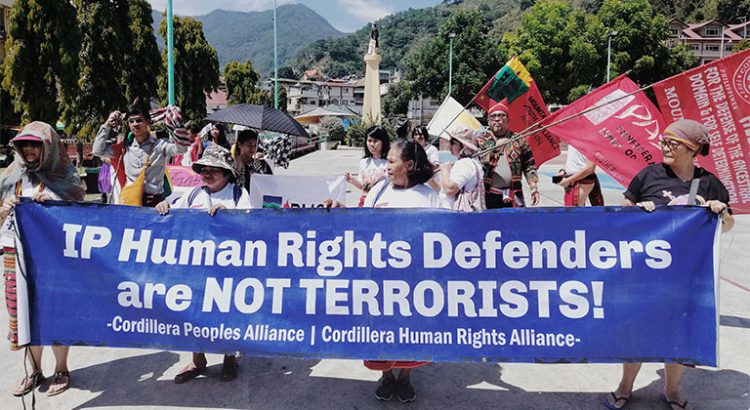Every 24th of April marks the commemoration of the death of Macli-ing Dulag, a chieftain of the Butbut tribe in the northern Philippine province of Kalinga. Macli-ing led the fight against land grabs masked as infrastructure and development projects in the mountainous and mineral-rich region of Cordillera. Since 1984, the day has come to be known as “Cordillera Day” and celebrated all over the region as a testament to the political solidarity of various indigenous groups forged through the common struggle for self-determination and social justice.
PAN Asia Pacific (PANAP) and the People’s Coalition on Food Sovereignty (PCFS) joined the Cordillera Day celebration in its 35th year, under the theme “Resist tyranny: advance the politics of change and self-determination.”
We recognize, after all, that the campaign for food sovereignty is not divorced from the fight for self-determination of indigenous peoples, who have for centuries carried on their culture and systems of production away from the whims of markets and global corporate regimes. We also recognize how tyranny has intensified the repression being faced by indigenous communities worldwide, including those in the Cordilleras, that are asserting their legitimate collective rights to their lands and resources.
The following joint solidarity message from PANAP and PCFS was read on 27 April 2019 in the Cordillera Day celebration in Bontoc, Mountain Province, Philippines:
—
PAN Asia Pacific (PANAP) and the People’s Coalition on Food Sovereignty (PCFS) are one with the indigenous peoples of Cordillera in their struggle for self-determination and against all forms of repression and exploitation.
Our campaigns on the ground and various exchanges with organizations and communities of indigenous peoples and other oppressed rural sectors have taught us that inextricable from the fight for preserving the indigenous peoples’ ways of life and culture is the defence of land. In the Philippines and elsewhere, indigenous groups are alienated from no less than their own lands, displaced and even intimidated, harassed, or killed.
Indeed, it was the encroachment on the Kalinga and Bontoc peoples’ ancestral lands, through the World Bank-funded Chico River Dam Project, that Macli-ing Dulag opposed, resulting in his murder in the hands of military forces under the Marcos dictatorship.
Almost four decades since his death, land remains a major issue in the region. The increasing push for neoliberal globalization has ushered in big businesses that have no problem riding roughshod over indigenous communities. In the name of private profits, corporations plunder resources and are often backed by the government, with its pro-elite legal instrumentalities and in many cases, with its armed forces.
We witness, for example, the renewed crackdown on community leaders in Colombia, who have lately been targets of harassment and even murder at record levels, perpetrated by organized armed groups in rural areas. In India, a recent order by the top court has declared as trespassers roughly a million Adivasis and other members of forest-dwelling tribal communities, who now face the threat of eviction from the lands they have lived in and cultivated for millennia.
But in the face of these injustices, the staunch resistance of indigenous peoples remains a strong force to be reckoned with. Recent years have seen more community-based efforts against land grabs, and similar assertion of these rights are making breakthroughs even in the global arena. Just this month, for example, Ecuador’s Waorani tribe won a historic lawsuit against three government bodies that put their ancestral lands up for sale to oil companies. This victory is but one of the many that demonstrate the power of relentless and collective mobilization.
Similarly, we laud and salute the Cordillera peoples for their ever-strengthening unity for the defence of their right to ancestral lands and resources. They have not only been keeping on and living up to the fight begun by the heroes and martyrs before them, for they also continue to serve as an inspiration to the oppressed peoples around the world grappling with large-scale resource extraction by big businesses and dominion by imperial powers.
Our voices here today could only resound the calls that the indigenous peoples of Cordillera have been demanding the government to heed for a long time. Policymakers must now begin to recognize the rights of one of the most vulnerable segments of the society, to protect and promote their access to and control over lands and resources, and to advance their campaign for genuine pro-people development.








Discussion about this post